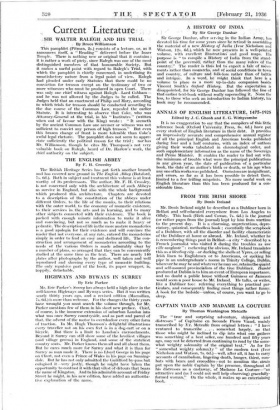Current Literature
This pamphlet iPitman, 2s.) consists of a lecture, or, as it announces itself, a "Reading' delivered before the Inner Temple. There is nothing new or original that it contains ; it ii_rather a work of piety, since Ralegh was one of the most distinguished members of that honourable Society. But it makes a useful poiot with regard to Ralegh's Trial, with which the pamphlet is chiefly concerned, in underlining its unsatisfactory nature from a legal point of view. Ralegh had pleaded under early Statutes that there could be no conviction for treason except on the testimony of two or more witnesses who must be produced in open Court. There was only one chief witness against Ralegh—Lord Cobham— and he was not allowed by the Judges to be called. The Judges held that an enactment of Philip and Mary, according to which trials for treason should be conducted according to the due course of the Common Law, repealed the earlier Statute. It is interesting to observe that Coke, who was Attorney-General at the trial, in his " Institutes " (written when out of favour with the King) wrote : " It seemeth by the ancient Common Law one accuser or witness was not sufficient to convict any person of high treason." But even this brazen change of front is more tolerable than Coke's awful legal rhetoric. The pamphlet does not seem to appre- ciate sufficiently the political reason for the trial ; nor has Mr. Williamson, though he cites Mr. Thompson's not very valuable book on Ralegh, heard of Dr. Harlow's work, the chief authority on the subject.














































 Previous page
Previous page